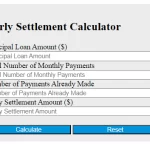Loan settlement and debt forgiveness are both mechanisms for resolving debts, but they differ in their approaches and implications:
Loan Settlement:
1. Definition: Loan settlement refers to negotiating with a creditor to pay off a debt for less than the full amount owed. This typically involves a lump-sum payment or a structured repayment plan that is less than the original debt.
2. Negotiation Process: Borrowers or their representatives negotiate directly with creditors or through intermediaries like debt settlement companies or credit counselors. The goal is to reach an agreement on a reduced amount that the borrower can feasibly pay.
3. Implications:
– Credit Impact: Settling a loan can negatively impact your credit score because it indicates that you did not repay the debt in full as originally agreed.
– Taxation: Depending on the jurisdiction and the amount forgiven, settled debt may be considered taxable income, which means you might owe taxes on the forgiven amount.
– Creditor Approval: Creditors are not obligated to accept a settlement offer, and the decision to settle rests with their willingness to negotiate.
4. Types: Loan settlement can apply to various types of debts, including credit card debts, personal loans, and sometimes even mortgage debts in certain situations.
Debt Forgiveness:
1. Definition: Debt forgiveness, also known as debt cancellation or debt relief, occurs when a creditor voluntarily forgives some or all of a borrower’s debt, relieving them from the
obligation to repay it.
2. Voluntary Action: Debt forgiveness is typically initiated by the creditor or lender, often in situations where the borrower faces extreme financial hardship or as part of a structured debt relief program.
3. Implications:
– Credit Impact: Like loan settlement, debt forgiveness can impact your credit score, but it may have less severe consequences than settling a debt for less than the full amount.
– Taxation: Forgiven debt may be considered taxable income, unless certain exceptions apply (e.g., insolvency).
– Legal Considerations: In some cases, debt forgiveness may have legal implications depending on the terms of the forgiveness and the jurisdiction.
4. Types: Debt forgiveness can apply to various debts, including credit card debts, student loans, mortgage debts (through mortgage forgiveness programs), and other types of consumer debts.
Key Differences:
– Initiation: Loan settlement is typically initiated by the borrower seeking to negotiate terms with the creditor. Debt forgiveness is initiated by the creditor, often as a result of a formal agreement or as part of a program.
– Amount Paid: In loan settlement, the borrower pays a reduced amount of the debt. In debt forgiveness, the borrower may not be required to make any further payments on the forgiven portion of the debt.
– Tax Implications: Both loan settlement and debt forgiveness can have tax consequences, but the specific implications can vary based on the circumstances of the forgiveness or settlement.
– Credit Impact: Both can negatively impact credit scores, but the severity and duration of the impact may differ.
In summary, while both loan settlement and debt forgiveness aim to resolve debts, they involve different processes, implications, and impacts on borrowers’ financial situations. Understanding these differences can help individuals make informed decisions about managing their debts and seeking appropriate assistance when needed.
Also Read- https://settleloan.in/blog/settleloan/steps-to-achieve-successful-loan-settlement/
Get in touch with us today at www.Settleloan.in and embark on your path to financial freedom



